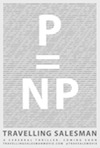cryptography
How do you create dramatic film out of mathematics? We find out with writer and director Timothy Lanzone.
Alan Turing – brilliant mathematician, code breaker during World War II – achieved so much during his tragically short life. But how do you put Turing's life and mathematics on stage... and as a musical?
Bitcoin is a digital currency that isn't regulated by any kind of central authority. The structure which allows this decentralisation is called blockchain. But how, and how well, does it work?
Can you encode a message so that errors in transmission are automatically corrected?
A quick look at the role of mathematics in communication — from making and breaking codes to making sure messages arrive intact.
A team of computer scientists has found a weakness in the world's most popular anonymity service.
Marcus du Sautoy talks about football, cryptography, and numbers.
If you are prone to forgetting your passwords, you're not alone. To make sure
we remember all our passwords, many of us take measures that defeat the
purpose. These include, as studies have shown, using the same password for everything or writing them down on post-it
notes and sticking them to our computer. But such sloppiness makes
easy work for evil agents out to steal our data and identities. Now physicists from the US and Germany have devised a safer way of
using passwords that takes account of the human need for
memorability.
Alan Turing is the father of computer science and contributed significantly to the WW2 effort, but his life came to a tragic end. Stefan Kopieczek explores his story.
Crack codes, solve a mystery and even win prizes in the University of Southampton's National Cipher Challenge.
Fame, glory, and more importantly prizes are on offer in the National Cipher Challenge.
